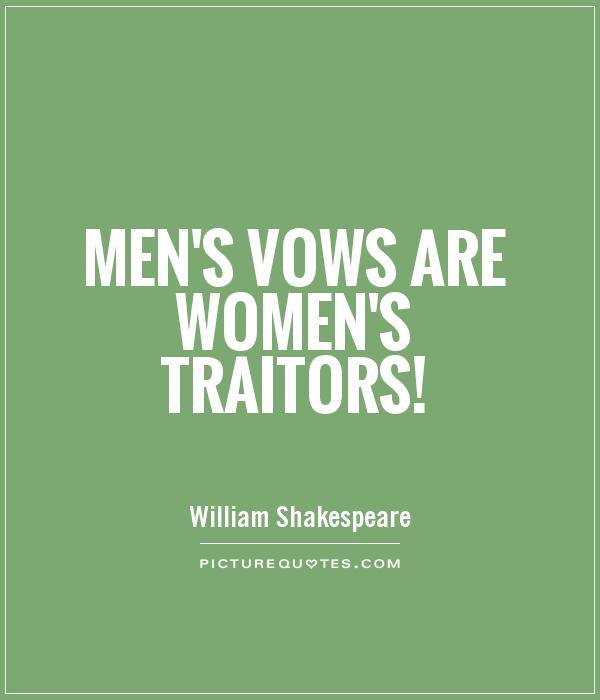Men's vows are women's traitors!

Men's vows are women's traitors!
In William Shakespeare's play "Much Ado About Nothing," the character Hero utters the famous line, "Men's vows are women's traitors!" This powerful statement reflects the theme of betrayal and deception that runs throughout the play, as well as the broader idea of the fragility of promises and commitments in relationships.The context of this line is a pivotal moment in the play, where Hero is falsely accused of infidelity by her fiancé Claudio. Despite her innocence, Claudio publicly shames her at their wedding ceremony, believing the deceitful words of his friend Don John over Hero's own vows of love and fidelity. This betrayal of trust and the breaking of vows highlights the destructive power of rumors and lies in relationships.
Shakespeare's words here speak to a larger truth about the unequal power dynamics between men and women in society. In the patriarchal world of the play, men hold the authority and are often quick to believe the worst of women, while women are left vulnerable to the whims and suspicions of their male counterparts. Hero's lament that "Men's vows are women's traitors" reflects the idea that women are often at the mercy of men's words and actions, and that their vows of love and loyalty can easily be betrayed and discarded.
This theme of betrayal and mistrust in relationships is a common motif in Shakespeare's works, as he explores the complexities of human nature and the often flawed and fickle behavior of individuals. In "Much Ado About Nothing," Shakespeare delves into the consequences of jealousy, deception, and misunderstandings in love, showing how easily vows can be broken and trust can be shattered.
Ultimately, Hero's poignant words serve as a reminder of the importance of honesty, communication, and mutual respect in relationships. They also highlight the need for both men and women to be mindful of the power of their words and the impact they can have on those they love.












 Friendship Quotes
Friendship Quotes Love Quotes
Love Quotes Life Quotes
Life Quotes Funny Quotes
Funny Quotes Motivational Quotes
Motivational Quotes Inspirational Quotes
Inspirational Quotes